Sustainable Shopping: A Guide to Eco-Friendly Grocery Shopping!
Sustainable Shopping: A Guide to Eco-Friendly Grocery Shopping!
In today’s world, where environmental consciousness is becoming increasingly important, adopting eco-friendly practices in every aspect of our lives is crucial. One area where we can make a significant impact is in our grocery shopping habits. By making conscious choices while shopping, we can reduce our carbon footprint, minimize waste, and support sustainable practices.
In this guide, we’ll explore practical tips for grocery shopping the eco-friendly way.
Eco-Friendly Grocery Shopping Tips: – 1
1.Plan Ahead:
Before heading to the grocery store, take some time to plan your meals for the week. Create a shopping list based on these meal plans to avoid unnecessary purchases and reduce food waste. Planning ahead not only saves you time and money but also helps you make more sustainable choices by only buying what you need.
2.Choose Local and Seasonal Produce:
Opt for locally grown fruits and vegetables whenever possible. Locally sourced produce has a lower carbon footprint since it doesn’t require long-distance transportation. Additionally, choosing seasonal produce supports local farmers and reduces the need for energy-intensive greenhouse production methods.
3.Reduce Packaging Waste:
Look for products with minimal or recyclable packaging. Choose items in bulk or those with eco-friendly packaging alternatives such as glass jars or paper containers. Avoid single-use plastics whenever possible and opt for reusable shopping bags, produce bags, and containers.
4.Shop at Farmers Markets or Bulk Stores:
Farmers markets are excellent places to find fresh, locally sourced produce with minimal packaging. Buying in bulk is another eco-friendly option as it reduces packaging waste and often allows you to save money. Bring your own containers and bags to fill up on grains, nuts, spices, and other pantry staples.
5.Support Sustainable Brands:
Be conscious of the brands you support and choose those that prioritize sustainability. Look for certifications such as USDA Organic, Fair Trade, Rainforest Alliance, or Certified B Corporation, which indicate a commitment to environmental and social responsibility.
Eco-Friendly Grocery Shopping Tips: – 2
6.Opt for Plant-Based Products:
Incorporating more plant-based foods into your diet can significantly reduce your environmental impact. Animal agriculture is a major contributor to greenhouse gas emissions, deforestation, and water pollution. By choosing plant-based alternatives to meat and dairy products, you can help mitigate these environmental issues.
7.Minimize Food Waste:
Approximately one-third of all food produced globally is wasted each year. Combat food waste by buying only what you need, storing food properly to extend its shelf life, and repurposing leftovers into new meals. Consider composting food scraps to reduce methane emissions from landfills.
8.Choose Sustainable Seafood:
When purchasing seafood, look for eco-friendly options that are sustainably sourced and certified by organizations like the Marine Stewardship Council (MSC) or Aquaculture Stewardship Council (ASC). Avoid species that are overfished or caught using destructive fishing methods.
9.Shop Mindfully:
Take your time while shopping and pay attention to product labels and ingredient lists. Choose products with natural, non-toxic ingredients and avoid items containing harmful chemicals or additives. By making informed choices, you can prioritize your health and the health of the planet.
10.Reduce Energy Consumption:
Consider the environmental impact of transportation when shopping for groceries. Choose stores that are close to your home or opt for walking, biking, or using public transportation to reduce your carbon footprint. If driving is necessary, carpooling or combining trips can help minimize emissions.
Eco-Friendly Grocery Shopping Tips: – 3
11.Stay Informed and Educate Others:
Stay updated on environmental issues and sustainable practices related to food production and consumption. Share your knowledge and experiences with friends, family, and community members to inspire collective action towards a more sustainable future.
12.DIY and Homemade Options:
Consider making your own pantry staples such as bread, granola, nut butter, and sauces. This not only reduces packaging waste but also allows you to control the ingredients, opting for organic and sustainable options.
13.Shop Ethical and Fair Trade:
Look for fair trade certifications on products like coffee, chocolate, tea, and sugar. Fair trade ensures that producers in developing countries receive fair wages and work in safe conditions, promoting social and economic sustainability.
14.Reduce Meat and Dairy Consumption:
Even if you’re not ready to go fully plant-based, reducing your consumption of meat and dairy products can still have a positive impact. Choose meatless options a few times a week or participate in initiatives like Meatless Mondays to gradually decrease your environmental footprint.
15.Support Food Recovery Programs:
Consider donating surplus food to local food banks or participating in food recovery programs that redistribute excess perishable items to those in need. This not only reduces food waste but also helps alleviate hunger in your community.
Eco-Friendly Grocery Shopping Tips: – 4
16.Invest in Reusable Containers and Utensils:
Bring your own reusable containers, jars, and utensils when shopping for bulk items or deli products. Avoid disposable plastic cutlery, straws, and containers by opting for reusable alternatives made from stainless steel, glass, or bamboo.
17.Choose Eco-Friendly Cleaning Products:
Look for environmentally friendly cleaning products that are biodegradable, non-toxic, and free from harsh chemicals. Consider purchasing concentrated formulas or refillable options to minimize packaging waste.
18.Practice Conscious Consumption:
Before making a purchase, consider whether you truly need the item and its long-term environmental impact. Opt for durable, high-quality products that are built to last rather than disposable or single-use items.
19.Grow Your Own Produce:
If you have the space and resources, consider starting a small garden to grow your own fruits, vegetables, and herbs. Not only does gardening provide fresh, organic produce, but it also connects you to the natural world and reduces the need for transportation and packaging.
20.Get Involved in Community Initiatives:
Join or support community initiatives focused on sustainable food production, such as community-supported agriculture (CSA) programs, urban farming projects, or community gardens. These initiatives promote local food systems, biodiversity, and community resilience.
21.Stay Flexible and Open-Minded:
Embrace a mindset of continuous learning and improvement on your journey towards eco-friendly grocery shopping. Stay open to trying new products, exploring different shopping methods, and adapting to changing circumstances and opportunities for sustainability.
Reusable Shopping Bag Options: – 1
Conclusion:
By following these tips, you can transform your grocery shopping routine into a more eco-friendly and sustainable practice. Every small change you make contributes to the larger effort of protecting our planet for future generations. Together, we can create a more sustainable food system and reduce our impact on the environment.

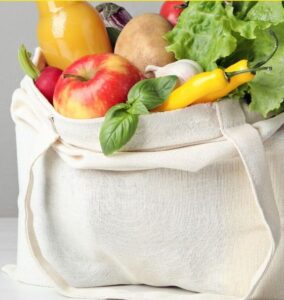
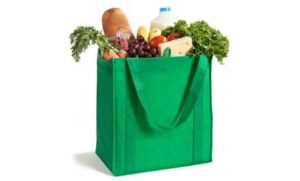

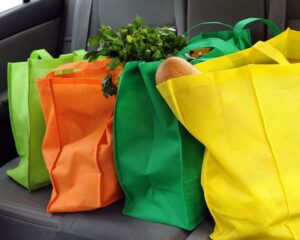
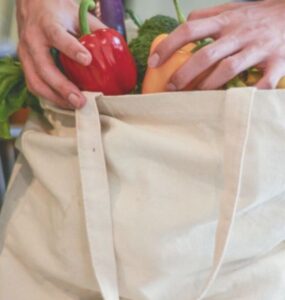
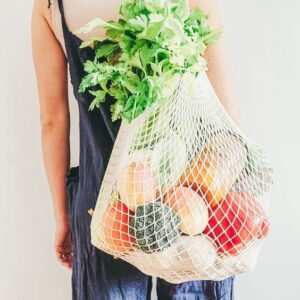
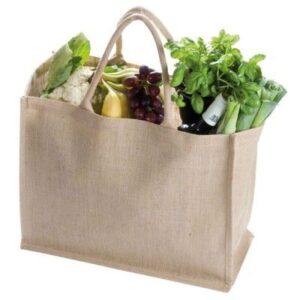
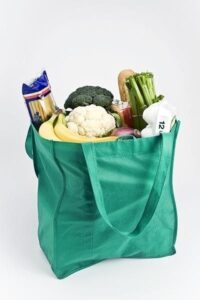
Leave a Reply